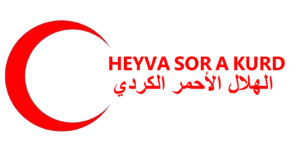The Kurdish Red Crescent has alleviated the burden of baby supplies in the Shahba camps.
In light of the high prices of goods and necessities, especially for children, which adds additional burdens to the displaced, our teams distributed diapers to children from newborns up to one year old in the Shahba areas camps (Berkadan camp – Sardam camp – Afrin camp – Al-Awda camp – Keshetar camp). The total number of beneficiaries from the distribution was 300 children.
































